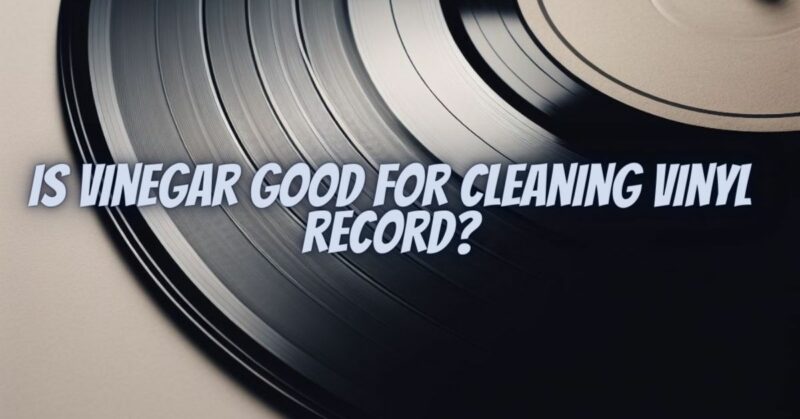Vinyl records have been making a comeback in recent years, captivating audiophiles and music enthusiasts with their warm, analog sound. To preserve and enjoy your vinyl collection, proper care and maintenance are essential. One topic that often comes up in the world of vinyl is whether vinegar is a suitable cleaning solution. In this comprehensive guide, we will explore the role of vinegar in cleaning vinyl records, its benefits, potential drawbacks, and alternative cleaning methods to help you make informed decisions about preserving your cherished vinyl collection.
The Importance of Cleaning Vinyl Records
Vinyl records are susceptible to accumulating dust, dirt, fingerprints, and other contaminants that can compromise sound quality. Cleaning your records not only enhances audio fidelity but also prolongs the lifespan of your cherished vinyl collection. Clean records are less likely to produce pops, clicks, and surface noise, providing a more enjoyable listening experience.
Is Vinegar a Viable Cleaning Solution?
Vinegar, a common household item, has garnered attention as a potential cleaning agent for vinyl records. Here are some considerations when using vinegar for record cleaning:
Benefits:
- Affordability: Vinegar is an economical option compared to specialized record cleaning solutions. Many people have vinegar readily available at home, making it a convenient choice.
- Gentle Cleaning: When used in moderation and properly diluted, vinegar can provide a gentle cleaning action that removes surface contaminants without damaging the vinyl or record labels.
- Mild Disinfectant: Vinegar possesses mild antiseptic properties, which can help eliminate bacteria or mold growth on vinyl records that have been stored in less-than-ideal conditions.
Drawbacks:
- Acidity: Vinegar is acidic, which can be problematic for vinyl records. Prolonged or improper use of vinegar may cause vinyl to degrade over time, affecting its long-term playability and sound quality.
- Residue: Vinegar can leave behind a residue that may affect the playback of your records. This residue can attract more dust and debris, making records dirtier over time.
- Label Damage: Excessive use or spillage of vinegar can damage the paper labels on records, potentially causing them to peel or become discolored.
Proper Use of Vinegar for Record Cleaning
If you choose to use vinegar for cleaning your vinyl records, it’s essential to do so cautiously and sparingly. Here are some guidelines to follow:
- Dilute Vinegar: Mix one part white distilled vinegar with three parts distilled water to create a mild cleaning solution. Do not use apple cider vinegar or other types of vinegar, as they may contain additional impurities.
- Apply Sparingly: Moisten a soft, lint-free cloth or a record cleaning brush with the diluted vinegar solution. Avoid excessive saturation, as you want to clean the record’s surface without oversaturating it.
- Gentle Cleaning: Gently wipe the record’s surface in a circular motion, following the grooves. Be careful not to apply excessive pressure, which can damage the vinyl.
- Rinse and Dry: After cleaning with the vinegar solution, rinse the record with distilled water to remove any residue. Use a separate cloth or brush moistened with distilled water for this purpose. Allow the record to air dry completely before playback.
Alternatives to Vinegar for Record Cleaning
If you’re concerned about the acidity and potential residue of vinegar, there are alternative cleaning methods and commercial record cleaning solutions available:
- Commercial Record Cleaning Solutions: Numerous record cleaning products are specifically designed for vinyl records. These solutions are formulated to clean effectively without causing damage or leaving residue. Follow the manufacturer’s instructions for best results.
- Record Cleaning Machines: Investing in a record cleaning machine can provide a thorough and efficient way to clean your vinyl records. These machines often incorporate a cleaning solution and vacuum system to remove contaminants and dry the record simultaneously.
- Carbon Fiber Brushes: Carbon fiber brushes are a gentle yet effective way to remove surface dust and debris from vinyl records. They are a practical choice for routine maintenance between deeper cleanings.
- Ultrasonic Cleaning: Ultrasonic record cleaning machines use high-frequency sound waves to clean records. While these machines can be expensive, they provide thorough cleaning without the need for chemicals.
Cleaning vinyl records is an essential part of maintaining their sound quality and longevity. While vinegar can be used as a cleaning solution, it should be employed with caution due to its acidity and potential for residue. When using vinegar, always dilute it properly, apply it sparingly, and rinse records thoroughly with distilled water. Alternatively, consider using commercial record cleaning solutions, record cleaning machines, carbon fiber brushes, or ultrasonic cleaning methods for a more specialized and effective approach to vinyl record maintenance. Regardless of your chosen method, the key is to handle your vinyl records with care and attention, ensuring that they continue to provide you with the rich, analog sound that vinyl enthusiasts cherish.


